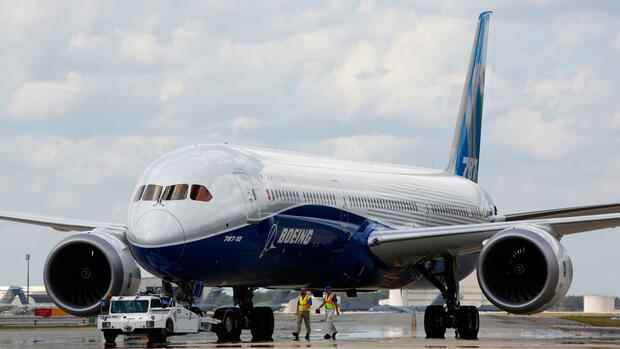The stop in production of the “Dreamliner” is one of the factors that again led to losses at Boeing.
(Photo: dpa)
new York The pandemic and production problems with the long-haul 787 “Dreamliner” jet have brought the US aircraft manufacturer Boeing a loss of 4.3 billion dollars in 2021. The Airbus competitor recorded a billion minus for the third time in a row for the year as a whole. Although sales increased by seven percent to $ 62.3 billion in the second year of Corona, the company performed significantly worse than analysts had expected. The only ray of hope: The US group has reported a positive cash flow again.
At Boeing, the hoped-for trend reversal is being postponed for the time being. In recent years, the group has caused scandals and doubts with the crash of the 737 Max, the effects of the corona crisis, the problems with the Dreamliner and a change of boss. Analysts had expected better news to come with the numbers.
Above all, the delivery stop for the “Dreamliner” had a negative impact. Boeing said it booked an additional charge of $3.5 billion in the fourth quarter due to delays in deliveries. That resulted in a quarterly loss of $4.54 billion. Boeing has not delivered the Dreamliner since May. Boeing does not provide a financial forecast for the current year, unlike suppliers such as General Electric or Raytheon Technologies.
The group estimates the costs for the reviews and revisions related to the production of the Dreamliner at a total of two billion dollars. Boeing expects this work to continue until the end of next year. The manufacturer said it was in detailed talks with the FAA about the necessary measures to be able to deliver the machines. There was no indication of when that might happen.
Top jobs of the day
Find the best jobs now and
be notified by email.
“Here we are again. Just as we saw with the 737 Max, Boeing is now piling up massive costs on the 787, with no clear end in sight and its fate in the hands of the FAA,” wrote analyst Rob Stallard of Vertical Research Partners to clients. The uncertainty surrounding the Dreamliner makes Boeing stock a “far more risky” investment than other quality aviation names.
Despite the sales crisis, Boeing is investing in an air taxi start-up
The revised accident model 737 Max has been allowed to be delivered again since November 2020. “We have ramped up production and deliveries and safely returned the 737 Max to service in nearly every market worldwide,” said Boeing CEO and President David Calhoun. In the fourth quarter, airlines ordered a total of 164 from the once extremely popular medium-haul carrier.
Despite the problems and the bad financial situation, Boeing surprised this week with the announcement that it would invest the equivalent of almost 400 million euros in the air taxi start-up Wisk. Above all, the US group wants to buy an insight into the technology of autonomous aircraft. While Airbus is working on it internally, Boeing is buying in the know-how.
>> Airbus has distanced Boeing 2021 for the third time in a row. Read here why nobody should write off the US group.
According to Boeing’s chief strategist Marc Allen, the aircraft manufacturer will support Wisk not only financially but also technically. The start-up is currently developing a four-seater electric aircraft and is seeking operating approval from the US authorities. Wisks is co-owned by Kitty Hawk Corp, an air taxi pioneer funded by Google co-founder Larry Page and run by German Sebastian Thrun. He was previously involved in the development of self-driving cars at Google.
“By investing in Wisk, Boeing has made a decision to purchase the self-flying aircraft technology rather than build it itself. It’s a risky and questionable move,” says aviation expert Henry Harteveldt of the Atmosphere Research Group. It is unclear whether self-flying aircraft make business sense and whether the FAA and customers will accept them, he says.
The analyst also questions the investment in a new line of business itself: “Boeing has put at least two new aircraft projects on the shelf,” notes Harteveldt. “In the meantime, Airbus has a much broader product portfolio and is thus securing more orders from the airlines.” Recently, many investors have had increasing doubts about the many air taxi start-ups.
More: Door-to-door by air taxi – airlines want to help shape the short trips of the future.
